 Petzlover
Petzlover Devon Rex is originated from United Kingdom but Somali is originated from United States. Both Devon Rex and Somali are having almost same weight. Both Devon Rex and Somali has almost same life span. Both Devon Rex and Somali has same litter size. Devon Rex requires Low Maintenance. But Somali requires Moderate Maintenance
Devon Rex is originated from United Kingdom but Somali is originated from United States. Both Devon Rex and Somali are having almost same weight. Both Devon Rex and Somali has almost same life span. Both Devon Rex and Somali has same litter size. Devon Rex requires Low Maintenance. But Somali requires Moderate Maintenance
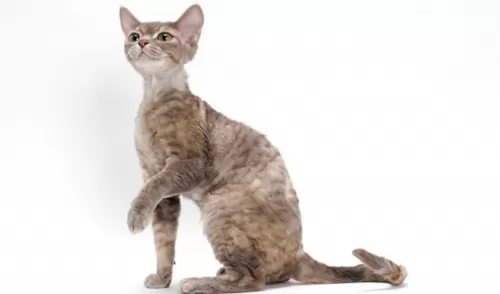 The Devon Rex is a cat known for its large ears and its curly, soft coat. It hails from England, emerging in the 1950s.
The Devon Rex is a cat known for its large ears and its curly, soft coat. It hails from England, emerging in the 1950s.
The cat is recognized by quite a few cat associations. The first of these cats was discovered by Beryl Cox in 1959 in Buckfastleigh, Devon. When the cat started appearing in cat shows in the UK, people starting becoming interested in owning these unusual cats.
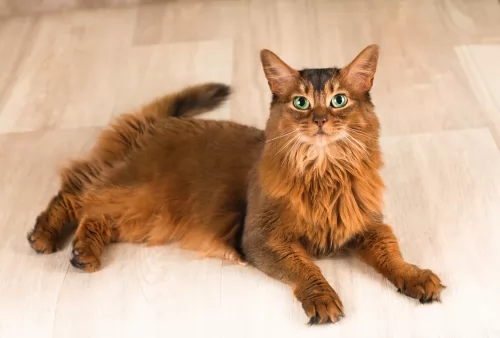 The Somali is a medium- to longhaired Abyssinian. It was in Britain that the original introduction of the longhaired gene took place.
The Somali is a medium- to longhaired Abyssinian. It was in Britain that the original introduction of the longhaired gene took place.
The first Somali cats came about in 1940 and it was British breeder Janet Robertson who exported some of her Abyssinian kittens to New Zealand, Australia and North America, Australia. Most of the kittens had long hair and breeders started showing an interest.
An American Abyssinian breeder Evelyn Mague decided to call her cats Somalis and the breed was recognized internationally by 1991.
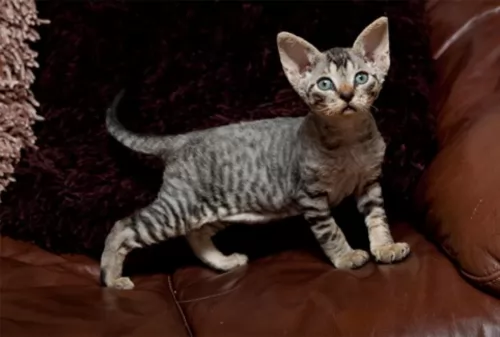 Known for its slender, light build, and weighing roughly between 2 and 4kg, the medium-sized Devon Rex has large, rounded ears. It is the large, rounded ears, set low on the sides of the broad head that make it slightly gremlin-like in appearance.
Known for its slender, light build, and weighing roughly between 2 and 4kg, the medium-sized Devon Rex has large, rounded ears. It is the large, rounded ears, set low on the sides of the broad head that make it slightly gremlin-like in appearance.
Their eyes are also large, and their noses are slightly upturned. It’s short, curly coat is another unusual feature and comes in many colors and patterns. The eyes can be blue, yellow, copper or he can be odd-eyed.
Your Devon Rex is quite a naughty cat, enjoying getting up to all kinds of mischief. Energetic, they love leaping up high onto perches so you’ll often find your Devon Rex in odd spots, more so if it's a spot in the sun as he loves warmth. It is why it is important to buy a cat tree for this cat.
It’s a loving, loyal cat and it will attach itself to one member of the family and then they are capable of pouring out the love and affection on this particular person. They’re also playful cats, as well as being intelligent.
He can learn a few tricks and can also be trained to walk on a leash. This is an active, energetic breed and will provide his human family with hours of amusing entertainment.
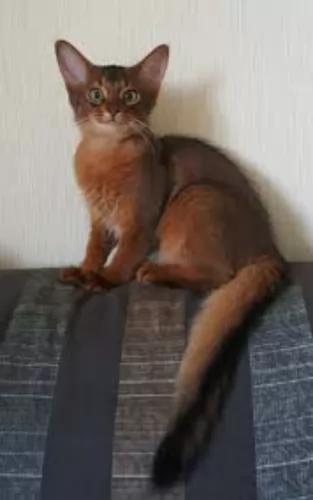 The beautiful Somali is a medium-sized cat which means he weighs in the region of 3 to 6kg. He is muscular and lean with the ears being set wide apart.
The beautiful Somali is a medium-sized cat which means he weighs in the region of 3 to 6kg. He is muscular and lean with the ears being set wide apart.
The ears are also tufted. The eyes of the Somali are almond-shaped and are usually a brown shade or green in color. The legs are long and the paws are also somewhat tufted. The tail is well plumed.
The Somali's coat is lovely and soft, while being thick and lustrous. The adult cats have a ruff. The Somali's coat comes in a range of colors but the most regular color is a beautiful brownish color with black ticking.
The Somali is an intelligent cat that relies heavily on its human owners for company as well as love and care.
They’re fun-loving cats that get on well with children in the home and from other pets. They are active cats and will need exercise. They should have some high perches and cat trees available so they can jump and climb.
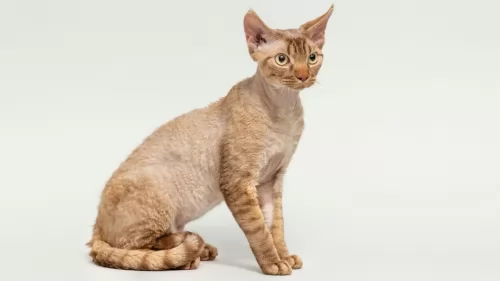 Your Devon Rex is a social cat and is happy to be found on your lap. He doesn’t take kindly to being left on his own though. He isn’t a suitable fit for someone who works all day.
Your Devon Rex is a social cat and is happy to be found on your lap. He doesn’t take kindly to being left on his own though. He isn’t a suitable fit for someone who works all day.
If you love animals, then maybe another companion animal would be a good idea as he is an amicable cat and gets on well with other animals.
When you spend time with your cat, make sure it is a special time, full of treats and stimulating play as he will learn to even fetch a small ball.
Just give him lots of attention and he’ll be your provider of companionship and entertainment.
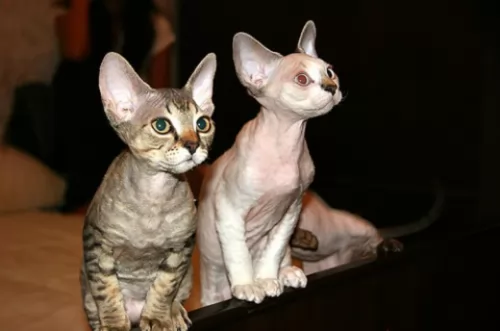 This particular cat isn’t known for any extreme health issues but even so, there are some health problems that are important to know about -
This particular cat isn’t known for any extreme health issues but even so, there are some health problems that are important to know about -
This is where the patella or knee cap moves out of its usual spot. It can occur because of a number of reasons such as an injury or congenital malformation. The vet will want x-rays because sometimes hip dysplasia is also present.
This is an inherited condition seen in both male and female cats and usually in young kittens. The cat has an odd gait with a head that bobs along as is tries to walk. The cat has tremors and also has difficulty with swallowing. With a visit to the vet and special care, your cat can do well.
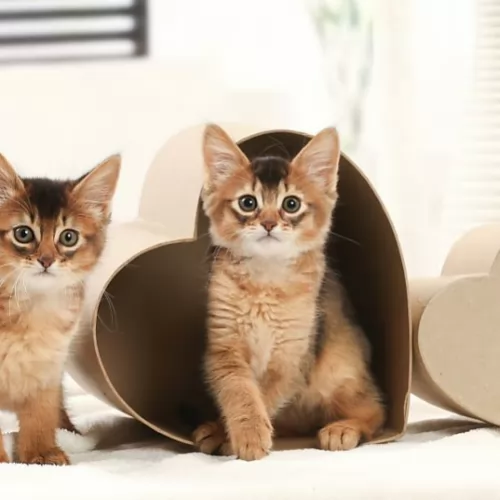 Although the Somali cat breed is healthy, as with many other cat breeds, there are a few hereditary diseases found in the Abyssinian that may be linked to this breed too. Look out for eye problems with the cat as well as anaemia.
Although the Somali cat breed is healthy, as with many other cat breeds, there are a few hereditary diseases found in the Abyssinian that may be linked to this breed too. Look out for eye problems with the cat as well as anaemia.
Progressive retinal atrophy (PRA) is a degenerative disorder of the retina. This eye disease can either be inherited or acquired.
When a cat gets sick there are some antibiotics that have been associated with progressive retinal atrophy in cats. Cats can also develop vision loss if their diet is deficient.
You have to be very aware of your cat’s diet and ensure that he is getting all the right ingredients, one of which is amino acid taurine. If you can see that your cat is battling to see, you should get him immediately to the vet.even though there is no treatment for PRA. . The vet will explain to you how to make life more comfortable for your pet.
Anemia isn’t a specific disease with your cat but rather the result of some other disease or condition. The most common sign that your cat has anemia is that you won’t find that normal pink color of the gums. Your cat will be listless and there may also be signs of blood loss such as blood in the feces or urine. Your vet will do several tests to diagnose the anemia.
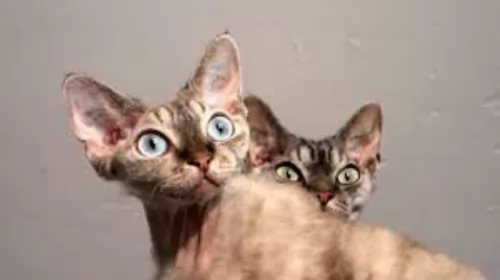 The Devon rex cat breed is known for its unusual looks with its wavy fur, large ears and large eyes. It is considered a rare breed and you want to make sure that you take proper care of him.
The Devon rex cat breed is known for its unusual looks with its wavy fur, large ears and large eyes. It is considered a rare breed and you want to make sure that you take proper care of him.
Owners of the Devon Rex know that these cats love their food and it has to be top quality food to enhance good feline health.
Cats are carnivores, ad this actually means that they should stick to a meat diet. Any food you buy your cat should be mainly meat. Look at the packaging of the commercially manufactured cat foods you want to buy, and make sure that the first few ingredients are some sort of meat.
Remember that any uncertainty with feeding your cat, you can chat with your vet.
Keep the inside of your cat’s ear free of an accumulation of wax and dirt as well as infection. If you don’t like the idea of probing in your cat’s ears, be in contact with your vet or a reputable, professional cat groomer.
Trim the cat’s nails.
Check inside his mouth for bad teeth as this could be causing him pain.
Clean your cat’s litter box every single day and also replace the grit regularly.
Get your cat veterinary care as soon as he shows signs of illness. Certainly, make sure all his vaccines and deworming are up to date.
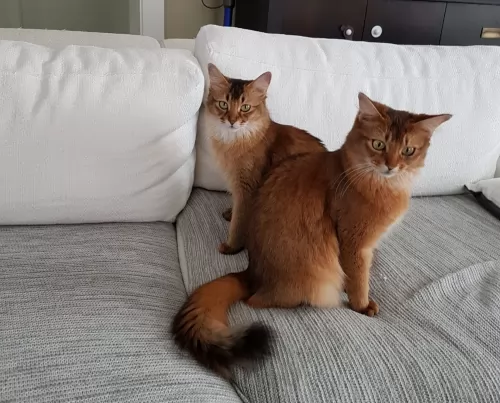 Cats can sometimes be finicky eaters and even the most delectable morsels might be ignored.
Cats can sometimes be finicky eaters and even the most delectable morsels might be ignored.
Every cat is unique but every cat is a carnivore – a meat eater – and requires a host of nutrients in their food to be healthy. Commercial cat foods aren’t all one and the same. You get different food for kittens, different foods for young adults, for pregnant cats, for energetic cats, and so on.
There is cat food for every season of a cat’s life. Other important considerations are feeding the right quantity of food to your cat.